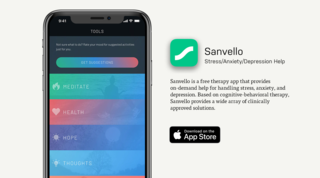The Sanvello App
An adjunct or even a replacement for a therapist?
Posted February 13, 2019 Reviewed by Gary Drevitch

Of course, no app can replace a talented, well-suited therapist. Alas, many people can’t afford one, and no one can have a therapist to call on 24/7, as often as one wants. And alas, not all therapists are talented, well-suited, accessible, and affordable.
Enter mental health apps. The most popular (2.6 million registered users) and arguably the most positively reviewed (4.7/5 with 2,000 reviews) is Sanvello.
The basic version is free and the paid version is $8.95 a month, $55 a year, or $199 lifetime—the cost of one or two therapy sessions. It’s available for iPhone, Android, and the web, although the latter, for now, offers fewer features. (I’ll note those below.)
What does Sanvello do? It describes itself as “an app for stress, anxiety, and depression based on cognitive-behavioral therapy, mindfulness, and wellness. Comprised of quick activities alongside a supportive community, Sanvello is designed as a daily tool to help people address stress and anxiety at a gradual pace.”
How well does Sanvello do it? The aforementioned 4.7 rating is especially impressive in that it addresses challenging problems in contrast with, say, a shoot-em-up game app. Also to Sanvello's credit, it was named an Apple App Store’s Best of 2017 and a Google Play Editor’s Choice.
The specifics
Here are Sanvello's major modules:
Guided Paths are “a series of self-help learning tools that combine an audio lesson with a related activity to help you learn different skills related to cognitive-behavioral therapy (CBT) and mindfulness. There are four Paths: Feeling Better, Taking Control, Building Confidence, and Mindfulness. Each Path is designed by psychologists to help you learn valuable strategies for managing stress, anxiety, or depression, with some help from the different tools in Pacifica.”
Sanvello lets you self-rate daily on whatever you care to track: for example, your mood, hours of sleep, exercise, substance abuse, sources of anxiety, even menstruation. In the iOS and Android but not yet the web version, you can set personally created goals for each and track your progress.
Sanvello’s Thoughts module, available in the iOS and Android but not yet the web version, “helps you understand your thinking patterns, challenge the thoughts to reduce your anxiety, and develop more balanced perspectives.” It lists common traps people fall into, ways to reframe your problem, and to journal your efforts to reduce your anxiety about the problem.
You can post comments on any of 15 communities and chat groups (the latter offers real-time conversations) and get comments and “hearts” from other Pacifica users. A sample of the groups: health, relationships, anxiety, school stress, work stress, your stories.
Sanvello also includes guided visualizations, 11 in the free version, 33 more in the paid. For example, in the one-minute deep breathing visualization, you hear and see a person breathing at the pace of your choice, from a five-second to a 25-second breath with your choice of soundscape, from gentle ocean to Bach to silence, at whatever volume you like.
Most of the other guided visualizations use the same format plus cognitive-behavior-therapeutic strategies. Seven to 10 minutes long, a calm voice asks you questions and offers suggestions, for example, on staying calm and grounded in situations that cause stress in many people: social situations, public speaking, school stress, taking a flight, public transit, anxiety emergency, going to work, going to the doctor, focus for studying, coping with morning dread, and processing grief. Some of the other visualizations are on getting motivated, negative thoughts, quieting the inner critic, defusing anger, coping with physical pain, and. falling asleep.
The takeaway
No app is a cure-all for even mild stress, anxiety, or depression, let alone severe cases, but Sanvello would seem to have no downsides and lots of upsides. It relies on mainstream respected psychological practices: cognitive-behavioral correcting of erroneous or unduly catastrophizing or insistent thinking, mindfulness, visualizations, self-tracking, goal-setting, and the option for peer support—all for free or, with the paid version, for less than a session or two of therapy. Sanvello strikes me as well worth a try.
























